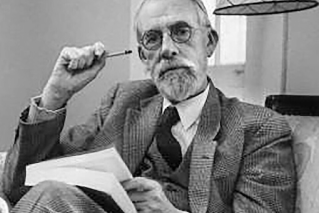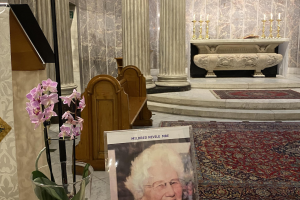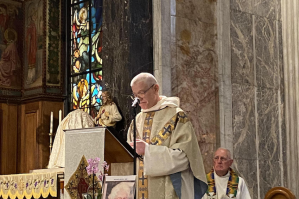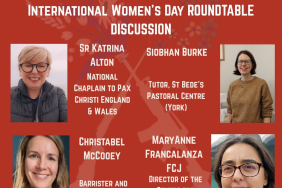Mildred Nevile - funeral tribute by Julian Filochowski
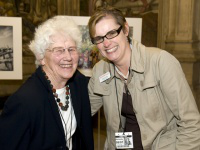
Mildred Nevile with Christine Allen
The following tribute to Mildred Nevile was delivered by Julian Filochowski at her funeral at St Joan of Arc's church in Highbury, north London.
Dear Friends
I imagine this is the very last party that Mildred will be hosting for us here in Highbury!
Mildred: You may know the name is Anglo Saxon - meaning 'gentle strength' or 'gentle counsellor'.
Mildred Nevile, our Mildred, our Millie, our gentle strength and gentle counsellor, died peacefully on Sunday September 2nd at St Joseph's Hospice in Hackney, a few hundred yards from my house.
It was what we would describe as 'a happy death'. Diagnosed with cancer of the oesophagus earlier in the year there was no long drawn out illness; just six weeks between her entering University College Hospital and her final moments at the Hospice - the Hospice which she herself had personally chosen. She was able to eat very little towards the end but there was no pain; her voice became rather weak but her mind remained strong. On good days she heard, she understood and she responded. On other days she was tired and she slept. On the Friday I brought greetings from her old friend Enda McDonagh in Ireland - and she asked after his health. On the Saturday she was anointed. She had put in order all that she wished; and on the Sunday morning she took her leave quietly and peacefully with her sister Eleanor at the bedside. Family and friends had been making brief visits over those last six weeks.
Mildred, our gentle strength, died as she had lived in faith, hope and love.
It would be difficult to orchestrate a more lovely departure. For my part I shall no longer pray to St Joseph as the traditional Patron of a Happy Death - but rather to Mildred sitting alongside him there in heaven.
Nevertheless, as I went into her room less than two hours after her passing, it was a terrible shock; and I was overcome with a gut-wrenching sadness - like so many of you I imagine. In truth, Mildred had been like a mother to me for 40 years - as 'gentle counsel', as mentor, offering generous encouragement and unconditional support in times of trial and gloom; but above all she was a greatly loved and wholly trusted friend.
And of course I am not alone. From her Young Christian Students (YCS) days, from her colleagues, friends and contacts of the CIIR, J&P, and CAFOD days, from the CHAS-Housing Justice world, from Pax Christi, from the refugee and asylum seeker networks, from the spirituality groups she was part of, and from so many fellow pilgrims - those who walked hand in hand and side by side with her on the way - there has been an astonishing outpouring of grief. Testimonies, tributes, stories and memories are circulating with many of them set out on the Independent Catholic News website. And even before the funeral we have seen fine obituaries in the Tablet and the Guardian.
To Mildred, everybody mattered; which is why she mattered to so many.
In all this there is great acclaim and admiration for an extraordinary and compassionate woman who committed her life, in word and in action, to justice for the marginalised and impoverished of this world; a selfless woman who lived out a fundamental gospel option for the poor. Mildred had an intense personal spirituality and a life of faith, without the trappings of piety; yet simultaneously she was an indefatigable "can-do" person who strived to generate solidarity with the poor within our comfortable Christian communities where ignorance and indifference have been sadly all too common.
In this she was a role model; she provided energetic leadership; she inspired and she encouraged; she coached and she nurtured talent; a whole generation of activists was her offspring. She was the enabler, the facilitator, a real people-person. It's striking what she achieved as a woman leader at a time when it was really difficult for women to make a visible mark - and she did it without making a 'feminist fuss'.
The formation that she had received as a young woman through YCS guided her through her whole life. Their Cardijn methodology of See-Judge-Act was central. And that came from three key principles so evident in Mildred's way of work: the truth about the reality; the truth of faith & the gospel; and the truth (and urgency) of action-response.
It was humble leadership that Mildred gave - modest by example. And today we can amazingly identify it as the Harvard Business School Level 5 leadership. That is the most effective leadership of all and goes by the name of 'the triumph of humility and fierce resolve'. Mildred hit upon this leadership style and refined it in her own way - this leadership style that took decades of research and countless redundant MBA theses to find and to articulate. One sentence from the Harvard paradigm: "Level 5 leaders blend the paradoxical combination of deep humility with intense professional will - and this rare combination defies our assumptions about what makes a great leader." That was Mildred indeed. Gentle strength. Intensely honest.
So Mildred invariably asked the question "Why" of any crisis or tragedy; the causes of poverty and marginalisation; the underlying cause of specific conflicts; the reasons behind particular unjust policy stances. Thence she moved CIIR to development education and action for change. So CIIR entered the world of policy advocacy long before the big charities - Oxfam, Christian Aid and CAFOD - dared to do so; and it was as an independent lay-run Catholic organisation with Mildred at the helm. Shrewd and intelligent, well-versed in Catholic Social Teaching she was imbued with the liberating spirit of Vatican 2. Her professional life more or less spanned Vatican 2 times. Vatican 2 did not ignite but rather fuelled her fundamental commitment. Justice and Peace is intrinsic to the legacy of Vatican 2 and Mildred could be described as the midwife of the Justice and Peace enterprise in this country. She assisted in establishing both the official hierarchy Commission and the national movement and she pressed and pressed the bishops and the traditional Catholic lay organisations to roll up their sleeves and get on with it.
Evident in all this are three pivotal qualities, a trinity of virtues, which I believe encapsulate Mildred's life and leadership. She was a woman of great wisdom, with rare courage and bound together by steadfast holiness. Wisdom, Courage and Holiness.
During the 1970s the most significant issue by far at CIIR was White Rhodesia - together with the decolonisation of southern Africa. There was extensive involvement with the Rhodesian Justice and Peace Commission in the midst of civil war - and colossal criticism was piled on CIIR from right-wing Catholic politicians in Britain, often sent formally to CIIR's President, the Cardinal. But there was no rowing back; Mildred had real unflappability despite the constant attacks. The critics never phased her; she had the necessary gravitas; she was well-centred; and she could be brow-beaten neither by politicians and government leaders nor by the Catholic aristocracy and business leaders. In the end she treated refugees and government minsters with exactly the same respect.
Cardinal Hume spoke fondly of Mildred, in private and in public, with an enormous respect for her integrity and her dignity - quietly admiring her perseverance in the face of adversity. But in 1974 his predecessor Cardinal Heenan was more hesitant. A terrible massacre had taken place at a place called Wiriyamu in Mozambique. Documented by Spanish missionaries it was analysed by Fr Adrian Hastings and distributed to the press by CIIR in 1973 - to coincide with the 200th anniversary of the Anglo Portuguese Alliance. This CIIR story grabbed the world's headlines just as the President of Portugal was arriving in London. Ferocious criticism of CIIR went to the bishops and the Charity Commission. But with Mildred's careful documentation and deft footwork a potentially dangerous and damaging rebuke to CIIR was transformed into a vote of confidence from the whole bishops' conference - made easier when the new government in Portugal confirmed the truth of CIIR's reporting.
How did CIIR get away with it, one theologian pondered, when elsewhere the British Church was still very muted in its promotion of justice and the defence of human rights within the tricky political realm? Ah, said another, it's probably because the older priests and bishops look on Mildred as their favourite sister and the younger ones as their favourite aunt! But the truth is that politicians and church leaders, Catholic and ecumenical, trusted Mildred. She engendered trust.
Amusingly, on the day the Wiriyamu story first appeared in the press, Mildred's bedsit flat in Holland Park was apparently the only available venue for a hurried strategy meeting to prepare the big press conference. But Mildred had no food in - so she sent out for some take-away food. There was then the strange spectacle of the distinguished political leader Mario Soares (subsequently President of Portugal), Fr Adrian Hastings, journalists from the FT and the Sunday Times and CIIR staff sitting on Mildred's floor munching Kentucky Fried Chicken and drinking some pretty vile wine that had been left over from the CIIR AGM the previous week. Yet the end result was brilliant!
The big question is: How can you become a highly organised Good Samaritan without becoming excessively institutionalised? Love is the answer. Mildred had it by the bucketful.
As I left CIIR for CAFOD in 1982, I asked Mildred, since she had been involved in CAFOD and its Board for 20 years from its founding in 1962, what would be the single key change she would work towards were she in my shoes. Without a moment's hesitation she said 'Well, such a lot of money is spent on advertising in the Catholic newspapers I'd cut it back and spend the money saved on setting up a CAFOD presence in the northern heartlands and the Midlands. And that was the seed that soon became the CAFOD regional and diocesan office network. Four years earlier Mildred had persuaded a sceptical CAFOD Board and a somewhat dubious CAFOD management group to allow a proposal from Cathy Corcoran for a CAFOD Education campaign to go forward, at least on a trial basis. And, de facto, that was the birth of CAFOD's flourishing campaign and advocacy work. Fittingly Mildred's last major public outing was to the CAFOD Golden Jubilee celebration in Westminster Cathedral in January this year.
Over the years whilst applauding and celebrating the genius and prophetic witness of many fine bishops with whom CAFOD and CIIR collaborated, I and many others of you, have felt frustration at what we might describe as the periodic follies of Vatican officials and occasionally the less than enlightened actions of other bishops too - like the banning of Latin American theologians, the investigation of the US women religious, or the culpable ignorance surrounding prevention issues in the AIDS pandemic. Whenever we vented that distress Mildred would listen knowingly and sympathetically and usually share the frustration. But if the deflation of spirits continued for too long she would seek to revive in us a sense of hope and a determination to keep going even as the going got ever tougher. And if I ever became obsessed with the antics of prelates in Rome (which I admit I did from time to time) Mildred would quietly remind me that we belonged to a Christ-centred Church and that I should remember that it was God we worshipped not those who spoke to us about God.
From her hospital bed Mildred was frequently asking after the progress of the Olympic Games. And this was not simply part of Mildred's well-honed conversationalist technique. Not many realise that Mildred was greatly interested in sport - and soccer in particular. She was an enthusiastic Arsenal fan and I am told she would be glued to the set when they were playing; this prompted the same Fr Enda McDonagh, a long-standing supporter of Manchester United, to comment 'Well, not everybody can be that perfect!'
In her latter years Mildred regularly visited asylum seekers held at Harmondsworth Detention Centre. She organised Christmas parties in her flat for refugees of many nationalities. She also took up 1-1 spiritual direction on the completion of a three year course in Ignatian spirituality. In this way the world came to her in Highbury through these 'directees' and it kept her fully occupied as she gradually left behind many of her committees and trusteeships. But she remained active to the end and in 2010 at the age of 83 she seriously explored the possibility of joining the ten day pilgrimage to El Salvador to visit the Romero holy places.
Cardinal Martini, the former archbishop of Milan, whom Mildred greatly admired died two days ahead of her. His spiritual testament, published in the Tablet just days after his death, called in uncompromising terms for radical overhaul of the Church once more as the spirit of Vatican 2 begins to fade. It includes this paragraph:-
Theologians… have often used the image of the embers hidden under the ash. In the Church today I see so much ash covering the embers that I'm often overcome by a sense of impotence. How can we clear away the ash from the embers so that the flame of love can grow strong again? First of all we have to find those embers. Where are the individuals with the generosity of the Good Samaritan? Who have the faith of the Roman centurion? Or the enthusiasm of John the Baptist? Or the daring of Paul? Who are the faithful like Mary Magdalene? I suggest that the Pope and the bishops should find twelve unconventional people to take on leadership roles. Those who are close to the poor, who can galvanise young people by being willing to try new approaches. We need to be challenged by people who are fired by the spirit so that it can be spread far and wide.
Well it seems to me we are simply looking for a new generation of 'Mildreds'.
Recognising Mildred as pure gold, Archbishop Nichols closed his tribute to her with the words 'We shall miss her' but importantly he added 'We shall continue that work…".
It may be the end of a generation or indeed even the end of an era, as many have suggested, but Mildred would be horrified if this 'Year of Faith' were to mark the close of the Vatican 2 age or the end of the Justice and Peace era in Britain. That surely must be our commitment to her memory; to redouble our efforts - with her spirit of gentle strength remaining in all those whose lives she has touched over this spectacularly fruitful lifetime. As Christine Allen has written 'None of us should forget the debt we owe her. We may be bereft; the Church and the world have lost a tremendous person, but our loss is heaven's gain'.
And that's where she is; looking down on us with her wonderful smile, standing alongside her old friends Barbara Ward, Archbishop Denis Hurley and Dom Helder Camara. I hear her saying: 'Get on with it, Julian. Let them go enjoy that glass of wine in the hall'.
Mildred Nevile. Gentle Counsellor. May she rest forever in God's peace.
Read Ellen Teague's report of the funeral here: www.indcatholicnews.com/news.php?viewStory=21037



